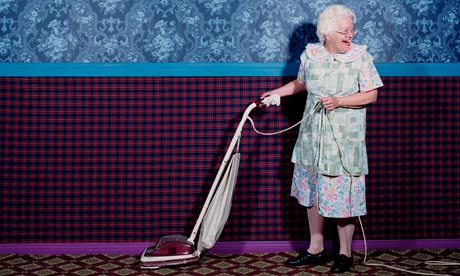http://humanresources.about.com/od/worklifebalance/a/business_women.htm
http://www.time.com/time/magazine/article/0,9171,2114439-2,00.html
First there was the mancession. Then there was the economic war on women.
Over the past four years, the monthly jobs figures have been spun like a
roulette wheel to declare which sex is gaining--or losing--from recession and
recovery. April's numbers show that women gained 73% of the 115,000 new jobs
added to the U.S. economy. Looks like we have a winner.
Or do we? The figures would seem to be welcome news for the Obama
Administration, which has been battling accusations by Republican challenger
Mitt Romney that the President's economic policies have hurt women. Yet since
the recovery began in June 2009, women have gained only 16% of the new jobs
created. What's more, over the past year or so, the workforce-participation rate
of women ages 45 to 54 has "dropped like a stone," says Julia Coronado, chief
North America economist at BNP Paribas. "Married, single-earner households are
on the rise, and married women are increasingly choosing not to work, in part
because many are finding that the jobs they can get simply aren't worth it in
terms of pay, commute, hassle, etc."
Which goes directly to the problem with those seemingly great April numbers:
most of that big job grab by women occurred in fast-growing but low-paying areas
like temporary help, private education, and health, leisure and hospitality.
Even in higher-end areas like professional and business services, where women
made gains, 51% of the jobs they nabbed were temporary, vs. 27% for men. "Both
women and men are gaining jobs in the private sector, but men are getting the
more secure jobs," notes Joan Entmacher, vice president for family economic
security at the National Women's Law Center. No wonder at least some married
couples are deciding to live on one salary when the economic trade-off of
lower-paying jobs, child-care costs, taxes and commuting doesn't add up.
The real problem for women is that they've suffered more casualties in the
war on the public-sector workforce that the Republicans have egged on. Budget
cuts at the federal, state and local levels of government--cuts that are at the
core of the GOP's smaller-government mantra--amount to 601,000 lost
public-sector jobs since June 2009. And two-thirds of those jobs were held by
women. University of California, Berkeley, professor Laura Tyson, a former head
of the Council of Economic Advisers under President Bill Clinton, believes
that's one big reason women over age 45 are leaving the workforce in droves. "If
you've been a decently paid teacher or a public administrator or a welfare
worker your whole life and you see what's available now, that might well make
you leave the workforce." Not necessarily by choice, either. Women are now a
greater percentage of the long-term unemployed than they were a couple of years
ago.
The other thing that's hurt women has been, ironically, the thing that's
helped men: the resurgence of manufacturing. When Detroit tanked, it produced a
mancession, and so it's only natural that the recovery of factory jobs has
disproportionately benefited men, who hold most of those jobs. Women represent
only about 23% of workers in the durable-goods sector, for example, which
includes things like automobiles and heavy machinery, and those are the American
manufactured goods that have been doing best, thanks to the building and
consumption boom in the emerging markets.
Of course, women will still benefit over the longer term from the fact that
they are earning the majority of college degrees (about 60% of them). Those who
are well educated, particularly with degrees in math or science, are starting on
an equal footing with men or in some cases an even better one. In many wealthy,
urban areas of the U.S. and Europe, young, well-educated and (crucially)
childless women now outearn their male peers.
But both the success of women at the top and the scramble for lower-paying
jobs at the bottom reflect a larger and more worrisome trend, the bifurcation of
the American workforce. It's the core economic issue of our time, and it's
likely to be one that hits women hardest. The middle-income jobs that are
returning are factory gigs going mainly to men. The public-sector positions that
sustained many women and allowed them to balance work and family over the past
four decades are going, going, gone.
What's left are the extremes: those with demanding, well-paid jobs who can
afford help to manage their lives, homes and children--and those who provide
that help. In that sense, the shrinking middle may turn out to be not just a
class issue but a gender one as well.
Read more: http://www.time.com/time/magazine/article/0,9171,2114439,00.html#ixzz2PoVECCTt





